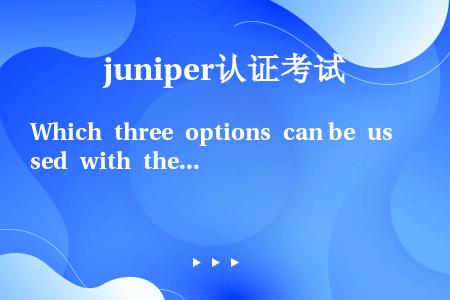 多选题
多选题
Which three options can be used with the load CLI command?()
发布日期:2022-07-19

merge
replace
partial
complete
override
标签: "暂无标签"

题王网让考试变得更简单
扫码关注题王,更多免费功能准备上线!

此试题出现在
Passage 3 Frustrated by excessive demands at work? Resentful of being passed over for a promotion? Afraid of losing your job? Never fear. A “toxic handler” may be near. Two University of British Columbia researchers poking around at the underside of corporate life have identified this new kind of hero. “Toxic handlers,” Peter Frost and Sandra Robinson write in the current Harvard Business Review, are employees skilled in removing the “metal toxins” of the modern workplace. The toxic handler — typically a senior manager but not the top boss — listens to troubled colleagues, invents creative solutions, and helps translate “mission impossible “ into “mission accomplished.” And far from being too focused on feelings to get the job done, toxic handlers make a real contribution to the corporate bottom line — if only by helping keep good people from leaving. One example the researchers cite is a computer executive in Europe who was asked to guide a 120- member team, already shell-shocked from downsizing into using an “open concept “office layout. It was a radical idea since the employees were used to private offices. The executive’s approach was simply to listen to his colleagues. He called himself “Big Ears,” says Mr. Frost. The transition went smoothly. “The only complaints were that there weren’t enough trash cans,” he says. By combining interpersonal skills with technical competence, toxic handlers such as Mr. “Big Ears” help “manage organizational pain,” Frost adds. The article is full of metaphors of pain and poison, but it also identifies opportunities for leadership that can be practiced by employees at any level of an organization. Frost ticks off four key points that came from his research. “The whole notion that there are people who step in and manage pain; the fact that there’s a lot of pain out there to manage, largely as a result of corporate downsizing; the fact that the people I dealt with (in this research) were not ‘bleeding hearts’ or human resources specialists; and that a lot of them got pretty sick.” It is critical that toxic handlers avoid taking on the pain themselves, say Frost and Robinson. Health-care professionals are typically trained to defend themselves against putting their own health at risk by getting too caught up in their patients problems, Frost notes. But toxic handlers in the corporate setting run the same risk of exposure without adequate defense. “Managers get sent in with pop guns and little tin shields,” says Frost, when they should be protected “as if they were handling radioactivity.” Some toxic handlers might be described simply as office peacemakers. Consider Alexandra, a vice president at a financial institution in New York, she spent half her time as peacemaker among colleagues. The new MBAs coming to work there “always came in acting like they owned the world,” she told researchers. “They tended to be pretty arrogant and heavy-handed with the secretaries and clerical workers. They offended them so much that they couldn’t concentrate on their work. “So first I had to explain to the staff that these young professionals were… just seriously lacking in interpersonal skills. Then I had to pull the new MBAs into my office and help them understand that being a boss didn’t mean bossing people around.” Frost’s work on the concept of toxic handlers began when he noticed that he felt particular run down and burnt out at the end of managing a stint in 1994. Since then, he and Robinson have studied what he calls a “rolling sample” of about 70 toxic handlers in Canada, The United States, I Europe, and Australia. By definition, their data is anecdotal, and they have no means of cross-checking their subjects-stories. But Frost is confident. “We’re onto something with authenticity.” Frost and Robinson insist that toxic handlers are not “enablers” who make it possible for their bosses to get away with bad behavior. But Frost sees the next phase of their research focusing on “the role of the toxic handlers in educating toxic bosses in order to improve the situation.” 1. What is a toxic handler? Who can work as a toxic handler? 2. What is the significance of the promotion of the concept “toxic handler”? Who first started the study on this concept? 3. Explain briefly the four key points raised by Mr. Frost from his research. 4. Tell the meaning of the following metaphors used in the passage. a) “He called himself ‘Big Ears’.”(para. 4) b) “… the people I dealt with… were not ‘bleeding hearts’ or …”(para. 5) c) “Managers get sent in with ‘popguns’ and little tin shields…”(para. 6) d) “… as if they were ‘handling radioactivity’.”(para. 6)
核心是辅助旅游地企业的经营管理,参与旅游地的所有与经营有关管理工作的系统是()
男性,19岁,用油漆刷墙后发生喘息1天,伴轻咳、咳少量黏白痰,有过敏性鼻炎病史2年。最可能的诊断为()
不属于妊娠禁忌的是( )。
中共二大决定创办的一种全国性的政治刊物是()
将某—审计对象总体划分为若干具有相似特征级次总体的过程称为()。
可致纵隔扑动的疾病是()
下列理财产品中只可向个人客户发售的理财产品是()。
血虚型产后发热,治宜选用的最佳方剂为()
按照省厅运输质量标准化评分标准,矿车完好率低于85%,专用车辆完好率低于95%,扣()分。
暂无相关推荐~

